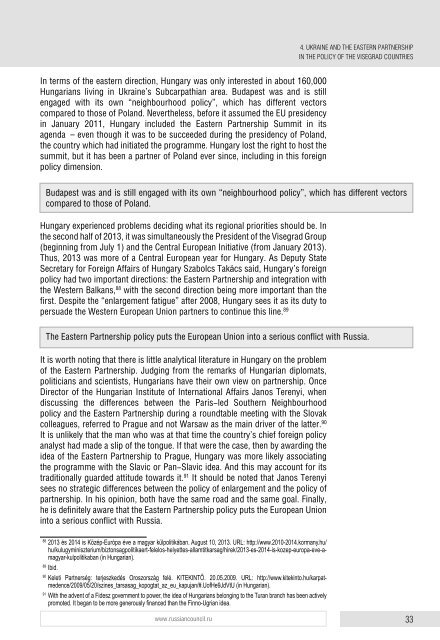RIAC-Visegrad-Report22-Eng
RIAC-Visegrad-Report22-Eng
RIAC-Visegrad-Report22-Eng
You also want an ePaper? Increase the reach of your titles
YUMPU automatically turns print PDFs into web optimized ePapers that Google loves.
4. UKRAINE AND THE EASTERN PARTNERSHIPIN THE POLICY OF THE VISEGRAD COUNTRIESIn terms of the eastern direction, Hungary was only interested in about 160,000Hungarians living in Ukraine’s Subcarpathian area. Budapest was and is stillengaged with its own “neighbourhood policy”, which has different vectorscompared to those of Poland. Nevertheless, before it assumed the EU presidencyin January 2011, Hungary included the Eastern Partnership Summit in itsagenda – even though it was to be succeeded during the presidency of Poland,the country which had initiated the programme. Hungary lost the right to host thesummit, but it has been a partner of Poland ever since, including in this foreignpolicy dimension.Budapest was and is still engaged with its own “neighbourhood policy”, which has different vectorscompared to those of Poland.Hungary experienced problems deciding what its regional priorities should be. Inthe second half of 2013, it was simultaneously the President of the <strong>Visegrad</strong> Group(beginning from July 1) and the Central European Initiative (from January 2013).Thus, 2013 was more of a Central European year for Hungary. As Deputy StateSecretary for Foreign Affairs of Hungary Szabolcs Takács said, Hungary’s foreignpolicy had two important directions: the Eastern Partnership and integration withthe Western Balkans, 88 with the second direction being more important than thefirst. Despite the “enlargement fatigue” after 2008, Hungary sees it as its duty topersuade the Western European Union partners to continue this line. 89The Eastern Partnership policy puts the European Union into a serious conflict with Russia.It is worth noting that there is little analytical literature in Hungary on the problemof the Eastern Partnership. Judging from the remarks of Hungarian diplomats,politicians and scientists, Hungarians have their own view on partnership. OnceDirector of the Hungarian Institute of International Affairs Janos Terenyi, whendiscussing the differences between the Paris-led Southern Neighbourhoodpolicy and the Eastern Partnership during a roundtable meeting with the Slovakcolleagues, referred to Prague and not Warsaw as the main driver of the latter. 90It is unlikely that the man who was at that time the country’s chief foreign policyanalyst had made a slip of the tongue. If that were the case, then by awarding theidea of the Eastern Partnership to Prague, Hungary was more likely associatingthe programme with the Slavic or Pan-Slavic idea. And this may account for itstraditionally guarded attitude towards it. 91 It should be noted that Janos Terenyisees no strategic differences between the policy of enlargement and the policy ofpartnership. In his opinion, both have the same road and the same goal. Finally,he is definitely aware that the Eastern Partnership policy puts the European Unioninto a serious conflict with Russia.882013 és 2014 is Közép-Európa éve a magyar külpolitikában. August 10, 2013. URL: http://www.2010-2014.kormany.hu/hu/kulugyminiszterium/biztonsagpolitikaert-felelos-helyettes-allamtitkarsag/hirek/2013-es-2014-is-kozep-europa-eve-amagyar-kulpolitikaban(in Hungarian).89Ibid.90Keleti Partnerség: terjeszkedés Oroszország felé. KITEKINTŐ. 20.05.2009. URL: http://www.kitekinto.hu/karpatmedence/2009/05/20/szines_tarsasag_kopogtat_az_eu_kapujan/#.UofHe9JdVtU(in Hungarian).91With the advent of a Fidesz government to power, the idea of Hungarians belonging to the Turan branch has been activelypromoted. It began to be more generously financed than the Finno-Ugrian idea.www.russiancouncil.ru33


